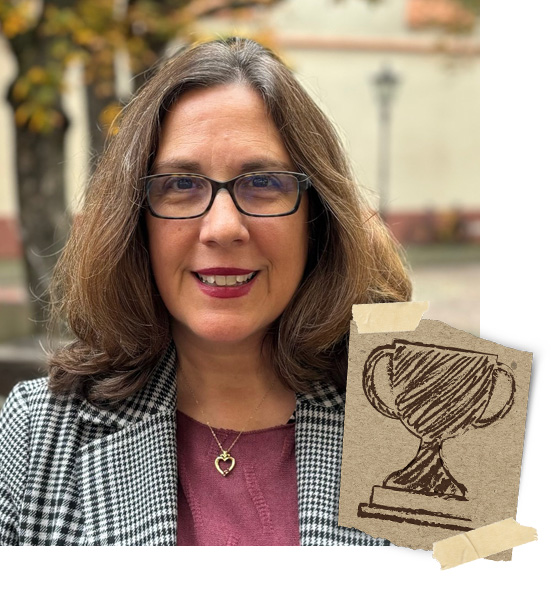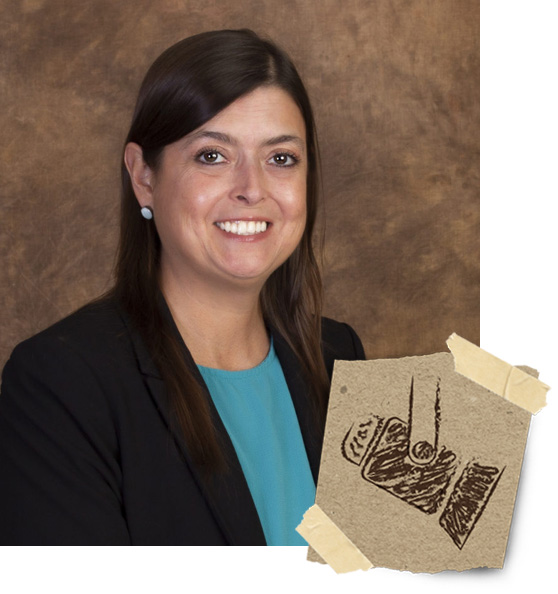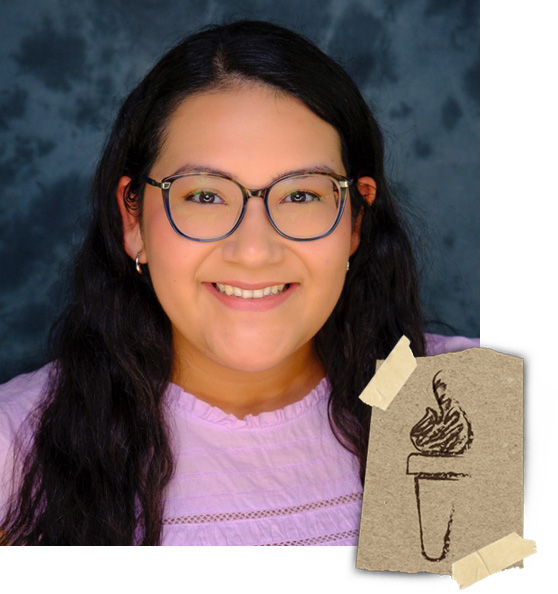Access Champion: Dr. Mindy Morgan
November 11, 2024 - Emily Jodway
 Dr. Mindy Morgan, an Associate Professor of Anthropology and an affiliated faculty member of the American Indian and Indigenous Studies Program, is our Access Champion honoree for the month of November. During November, we celebrate Native American Heritage month and honor the contributions, culture and history of Indigenous peoples in America. Morgan focuses much of her research on language ideologies surrounding the preservation, transmission and reclamation of Indigenous languages in Native communities.
Dr. Mindy Morgan, an Associate Professor of Anthropology and an affiliated faculty member of the American Indian and Indigenous Studies Program, is our Access Champion honoree for the month of November. During November, we celebrate Native American Heritage month and honor the contributions, culture and history of Indigenous peoples in America. Morgan focuses much of her research on language ideologies surrounding the preservation, transmission and reclamation of Indigenous languages in Native communities.
Morgan grew up in the mountain west and was exposed from childhood to the impressive number of Indigenous nations and communities represented in the plains region. Her first encounter with one of these communities was in high school, when she got to visit the Pine Ridge reservation in South Dakota. What struck her was the resilience of the community in the face of both real and perceived struggle.
“Pine Ridge in popular media is presented as the most poverty-stricken area in the United States, and there is a focus on struggles with addiction and other social welfare issues stemming from the structural violence that had been inflicted on the Lakota community,” she explained. “But my experience at Pine Ridge was meeting families and realizing how strong the kinship structures were. People looked out for each other. There were social problems, but they were dealing with them, with a sense of optimism that they could make things better.”
This interest in Indigenous communities carried on into college as she studied American Culture at Northwestern University. She spent time at a tribally controlled college on the Rosebud Reservation in South Dakota, Sinte Gleska (now Sinte Gleska University), where she first discovered how important Indigenous language programs and lessons were to these schools. Encouraged by this experience, she decided to pursue linguistics classes in addition to anthropology coursework as part of her PhD studies at Indiana University. This preparation enabled her to partner with Fort Belknap Nakoda community to help with language reclamation efforts at Aaniih Nakoda College.
“I didn’t know that language was going to be the area of my interest, but it became very apparent early on that that’s what community members were interested in,” Morgan said. “Their languages were no longer being transmitted to younger generations, but at the same time, there was still a speaking community and people were using it. It became very clear that if you wanted to get to the heart of the community, it had to be through language.”
Morgan became immersed in the world of language reclamation, both its practicalities and navigating how to represent language. “It’s not only the technicalities of it that are difficult, but also the larger social and cultural issues that surround language reclamation,” she explained. In graduate school, her early work explored the historical legacy of writing, its ideologies and practices, as well as how to develop Indigenous writing systems.
She came to Michigan State as one of the very first predoctoral Fellows in the American Indian Studies (now American Indian and Indigenous Studies) program. It was also the first year that Anishinaabemowin language classes were offered, and Morgan became acquainted with Helen Roy, the instructor at the time. The pair worked together often in the early years of the American Indian Studies program, establishing curriculum and research around language.
“[Helen] and I worked together to figure out some of the same issues that I was thinking about at the Tribal College in terms of how to integrate Indigenous language learning into institutions that aren’t necessarily set up for Indigenous language programming,” Morgan said.
Morgan is currently on sabbatical in Switzerland examining contributions from Indigenous authors to an early 20th century magazine. While the articles are written in English, they center around Indigenous knowledge and cultural practices. While on campus, she teaches several different classes in the anthropology department, including a class in language and culture introducing students to the idea of linguistic anthropology. Others include a course on North American ethnography, contemporary Indigenous communities in the United States, and ANP 811: Memory, Knowledge and Archives.
“My work within Indigenous language reclamation really comes into play in that class when we look at how languages in the past had been written down by anthropologists and other non-native folks, and then how communities can go into archives and reclaim that knowledge, bring it back and make it useful for their communities,” she explained.
One of the things Morgan loves most about being an educator is introducing new perspectives to students. In her smaller classes, she also enjoys tailoring the lessons to her students’ interests surrounding the main concept. Many of her classes also touch on the history and importance of MSU’s status as a land grant university. “Regardless of their major, I think it’s really important for students to understand our land grant focus so they can understand more about the communities among whom they live,” she explained.
“I also enjoy the fact that there are a number of Indigenous students that end up taking these classes, and it becomes a way of sharing and working together through past prejudices and coming to new understandings,” Morgan added.
Morgan believes there is always more we can learn about the Indigenous population, and that US society as a whole is still largely unaware of both the continued struggles they have experienced and the great wealth of culture and contributions these groups have brought to our country. She wants to emphasize that Indigenous communities are still working to tackle issues such as persistent violence, and the high rates of missing and murdered Indigenous women and children. But she believes that only discussing social problems can take away from seeing a tribe’s ability to persist, display resilience and thrive.
“It’s important, while we can’t forget the traumatic past or persistent struggles, we also cannot only focus on that,” she said. “We need to be focusing on these amazing communities, these incredibly vibrant communities.”
She also mentions the significance of including Indigenous communities and peoples in all conversations when it comes to nationwide policy and change. “If we’re talking about water, we need to be talking with Indigenous communities. If we’re talking about climate change, we need to talk with Indigenous communities again … issues of language, all that sort of stuff, we need to be talking to these communities” she said.
“November gives us a moment to pause and really understand Indigenous communities in their full complexity. It’s not just about the past, or the future, but appreciating all of it. It’s nice to have Native American Heritage Month as a way to give us some space to recognize differences among groups, and again, to really focus on the dynamic communities that they are right now.”
Honorees’ views are their own and do not necessarily reflect those of the College of Social Science.
Read more:

Access Spotlight
Alumni
Dr. Kehli Henry
Dr. Kehli Henry is our November Access Spotlight and an alum of Michigan State University’s Department of Anthropology. She is currently a Research Associate at STEM Ed PaCER Program, a collaboration between MSU, the Center for Native Peoples and the Environment at the State University of New York, and the Sustainable Development Institute at the College of Menominee Nation.

Access Torch
Student
Jessica Saucedo
Jessica Saucedo is our November Access Torch. A Psychology graduate student in the Ecological and Community Psychology program, Saucedo's current research focuses on how engaging in Native culture and language supports the physical, cognitive, emotional, and linguistic development of three- to five-year-old children.

Access Matters
We strive to cultivate an inclusive and welcoming college environment that celebrates a diversity of people, ideas, and perspectives.

